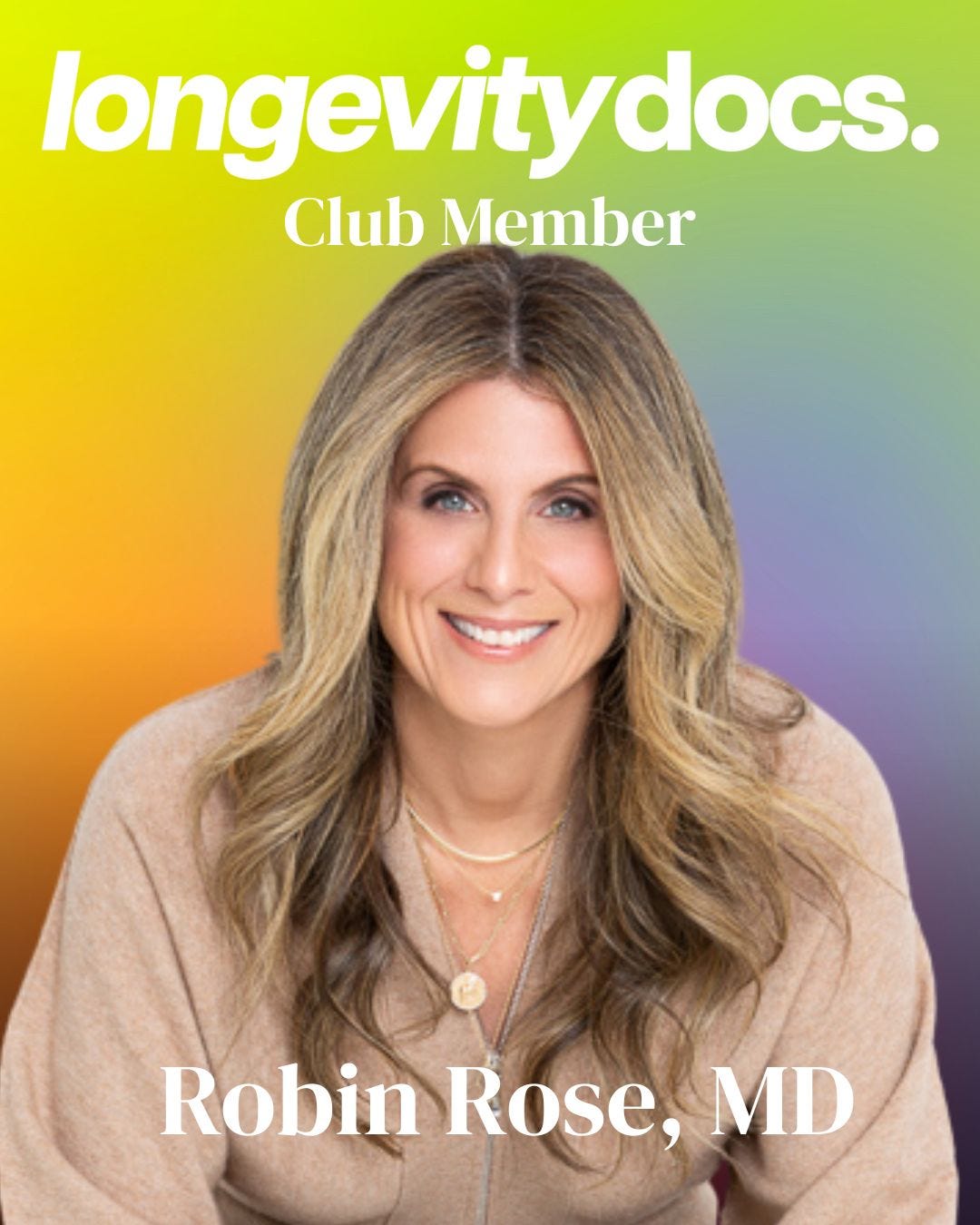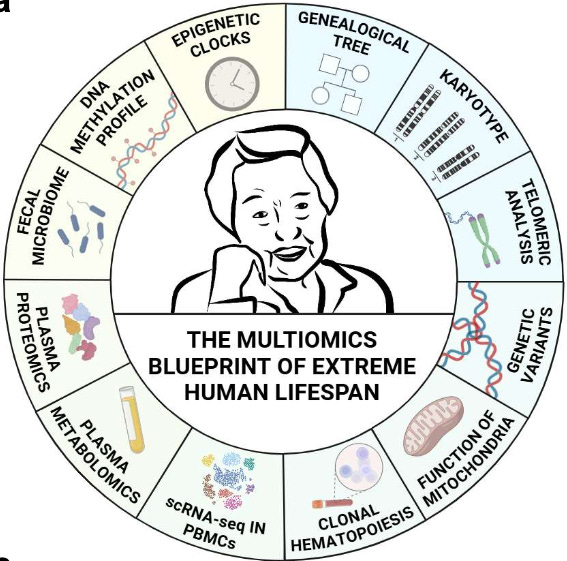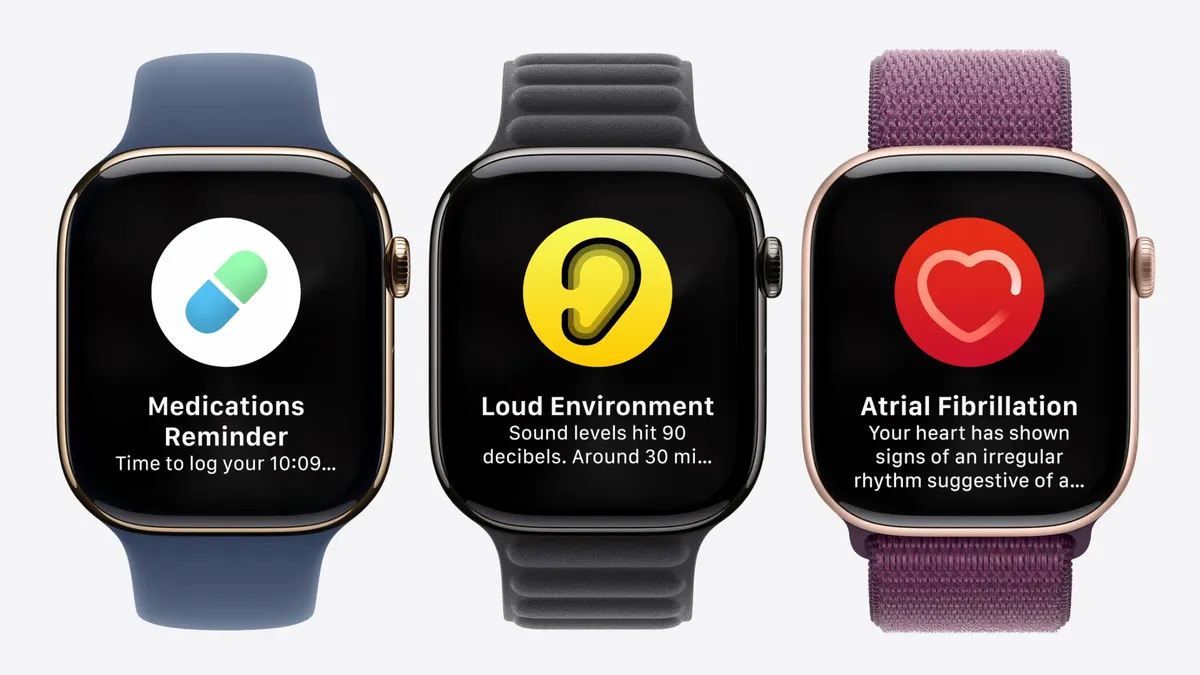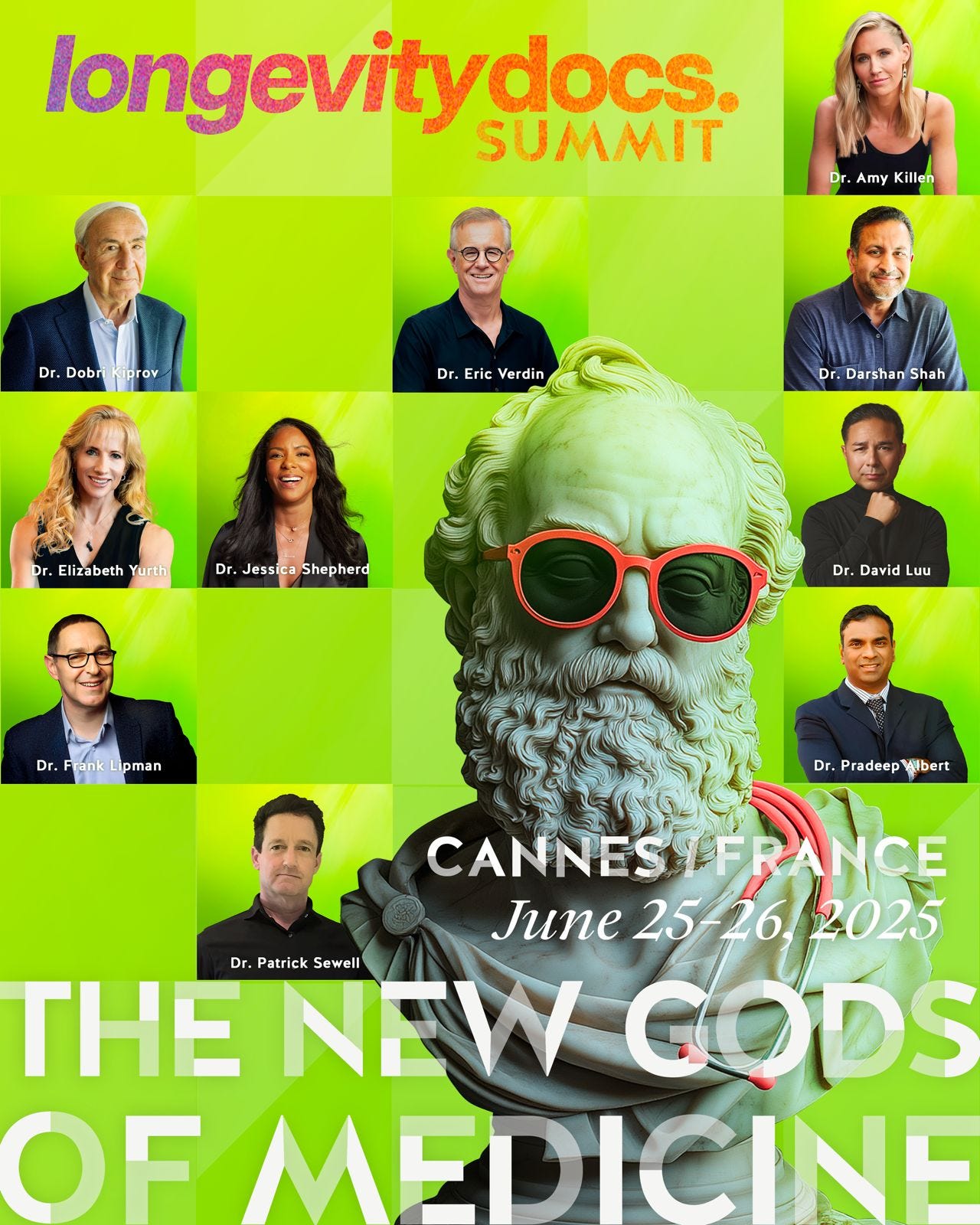The Apple Clinic? - The Netflix of Longevity - Longevity Challenge - Living too 117 - Methylene Blue - Microplastics Testing
Your sneak peek into the world of Longevity Docs.
Hey Docs,
We’re just 79 days away from Cannes. This Summit isn’t just a milestone for Longevity Docs... it’s personal.
Why? Because it’s full circle. My father landed in Cannes in the 60s and went to high school there, then became a doctor. So bringing the world's top longevity doctors to this city feels like a legacy moment -and I want to show up as the best version of myself.
That’s why I’m launching the Longevity Docs Challenge. A daily ritual to walk the talk and lead by example, because it’s more fun when we do it together.
I’m posting a video daily on social showing the 3 longevity rituals I’m committing to until the Summit:
100 pushups a day (with variation): boosting cardiovascular + resistance + mental grit
15 minutes of meditation or NSDR: sharping the mind and recover
1 meaningful conversation a day: connecting with friends, family, colleagues (yes, expect random call-outs from me!)
This isn’t a competition. It’s about accountability, transparency, and turning stress into something purposeful and joyful together.
Email me back if you are in!
In this week’s newsletter:
Exclusive: testing the Netflix of Longevity Medicine
Culture: can Apple become your next clinic?
Buzz in the Chat: Methylene Blue and Microplastics are heating up
Happy Sunday!!!!
Updates
🎬 The Netflix of Longevity Medicine
Imagine the most advanced education platform in longevity medicine: decentralized, global, and powered by the collective intelligence of the world’s leading physicians.
After the overwhelming response to our Virtual Mastermind, we knew it was time to go further: delivering even more high-quality, actionable content to physicians around the world.
Our mission is clear: to make cutting-edge, evidence-based longevity education accessible to every doctor, everywhere.
Coming soon: your first look at our Expert Classes.
🎓 Certified Longevity Physician™: Oversubscribed in Just 7 Days!
In just 7 days, our Certified Longevity Physician™ program is officially oversubscribed: with over 120 physicians from 20+ countries joining the global movement. From Singapore to South Africa, Italy to India, and Sweden to Costa Rica, the momentum is real.
This milestone brings us one step closer to our mission: to democratize access to cutting-edge longevity medicine and activate our community for the benefit of all.
Due to overwhelming demand, the Certified Longevity Physician™ program is now waitlist-only.
Don’t miss your chance to join the next cohort. Spots are limited and filling fast.
Join the waitlist now to secure early access before we open again.
Methylene Blue: Hero or Hazard?
This week in the Longevity Docs chat, a spirited and science-packed debate unfolded around methylene blue (MB): a popular mitochondrial support compound with a growing fanbase... and a few strong critics.
Dr. SM kicked off the conversation, reminding us that while MB shows promise, especially in mitochondrial dysfunction and Long COVID, we don’t have “elegant” tests yet to fully assess mitochondrial health. “I like to test first: acylcarnitines, OAT, Mitoswab before hot-wiring a clunker,” he said.
Dr. EY countered with a caution: MB is a potent nitric oxide (NO) inhibitor. She outlined how it blocks both NOS enzymes and soluble guanylate cyclase (sGC), potentially impairing NO signaling, even when co-administered with NO agents like Neo40. “Continuous use can stress the NO system... we need to cycle it,” she warned.
Dr. SS added nuance: “Low doses (8–25 mg) selectively inhibit inducible NOS (iNOS) without significantly affecting eNOS or nNOS.” He cited several studies supporting MB’s dose- and context-dependent effects and shared clinical success treating POTS and post-COVID fatigue with low-dose MB.
Dr. AV offered a systems-biology lens: “MB can either promote senescence or kickstart SIRT/PARP pathways depending on the context. Both statements can be true. The key is determining which patient profile you’re dealing with.”
The Takeaway from the chat:
Methylene Blue may be a powerful therapeutic, but it's not plug-and-play.
- Low doses can offer mitochondrial and neuroprotective benefits.
- Overuse or chronic dosing may disrupt NO pathways and backfire in sensitive patients.
- The consensus? Test, personalize, and cycle. This is mitochondria medicine, not magic. Much more research is needed.
As Dr. DS said best:
“Reading this discussion makes me feel like I’m in kindergarten: thank you both for leveling us up!”
Let the MB debate continue: intelligently, cautiously, and with biochemical nuance.
Trying out our first poll! We’d love to learn from you. Feel free to vote. Results shared next week.
Microplastic Testing: Exposure vs. Excretion
Dr. AV: “I’ve done several microplastic tests and results often don’t match reported exposure. Some obsessively clean patients have high levels, while others with high exposure show low levels. My hypothesis? It may correlate more with cellular health than just environmental exposure.”
Dr. DS jumped in to ask which tests he had used. The response: BJ’s test, which was confirmed by Darshan to be a private-labeled version of PlasticTox - a test several other docs in the chat are now trialing in clinic.
Dr. SM added: “I use Vibrant Wellness Total Tox, but it’s a urine test - so it only shows what the body is excreting, not what’s stored. That’s a key distinction.”
Dr. MEV confirmed experience with PlasticTox as well, adding to the growing list of docs looking for clarity.
Dr. AV said “If the body’s capacity to excrete plastics depends on cellular health, then high levels may reflect detox bottlenecks, not just lifestyle exposure. Maybe we’re better off helping patients improve cellular resilience than obsessing over where the plastics came from.”
The Takeaways: Microplastic testing may be less about tracking external exposure - and more about uncovering internal dysfunction. The test might not just say how much you're exposed to, but how well your body is processing the modern world.
More questions ahead:
Should microplastic levels be part of a functional detox assessment?
Do results correlate with metabolic, mitochondrial, or inflammatory markers?
Is it more useful as a marker of resilience than risk?
Stay tuned. This is just the beginning of the microplastics conversation.
Private Club
Member Spotlight
Meet the Longevity Doctors Club members: physicians entrepreneurs building the future of longevity medicine one practice (or more) at the time.
Robin Rose, DO
Founder, Terrain Health | Board-Certified in Gastroenterology & Internal Medicine | Functional & Precision Medicine Expert
Dr. Robin Rose is a board-certified gastroenterologist and internal medicine specialist leading the charge in root-cause, longevity-focused care. After experiencing burnout and health setbacks in her own life, Dr. Rose transitioned from conventional sick-care to founding Terrain Health, where she now helps patients optimize their healthspan and increase lifespan through precision diagnostics and integrative protocols.
With advanced degrees in behavioral neuroscience and neuropsychology, Dr. Rose blends her deep scientific expertise with a holistic approach, using advanced testing (across the microbiome, genome, metabolome, and exposome) to design personalized plans for healing from the inside out.
She is also at the forefront of long COVID treatment, partnering with world-renowned pathologists to pioneer biomarker-driven protocols. Her Long Hauler Index Score combines advanced bloodwork and immune analysis to guide care, supported by a dedicated clinical and coaching team for ongoing, individualized recovery.
Dr. Rose’s mission is simple:
“I don’t treat symptoms. I treat people. The goal is not just to live longer, but to live better.”
Join the Longevity Docs Club
If you’re a physician starting or scaling your longevity practice highly vetted Longevity Docs Club is for you.
Join a community of like-minded physicians and gain access to resources on marketing, finance, strategy, and technology to support your independent practice
Applications now open for MD, DO, or MBBS - Limited memberships
Global Network
Welcoming New Longevity Docs
Longevity Docs unites board-certified physicians from diverse specialties - including cardiology, endocrinology, surgery, psychiatry, public health, regenerative, and functional medicine - across private practice, academia, and health systems worldwide.
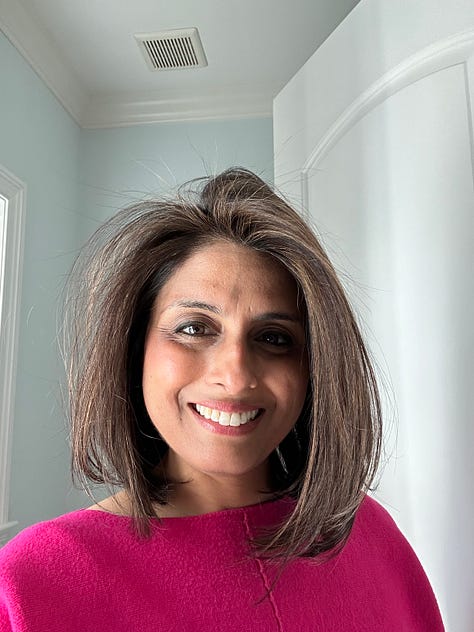
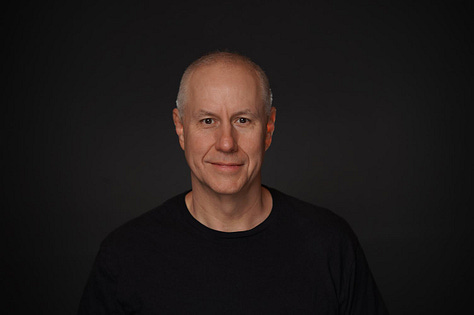
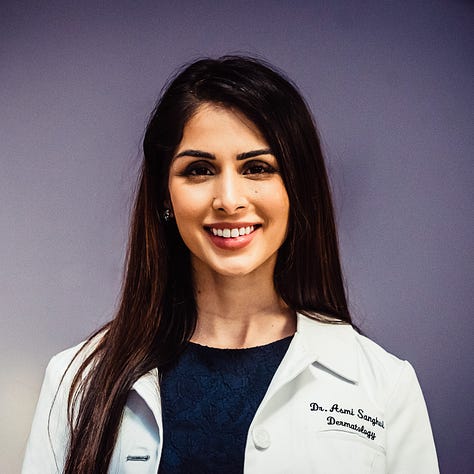
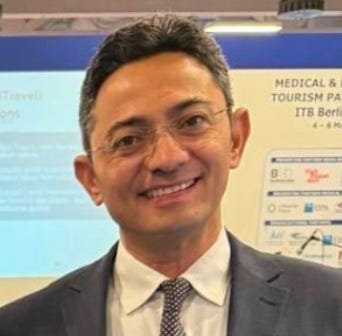

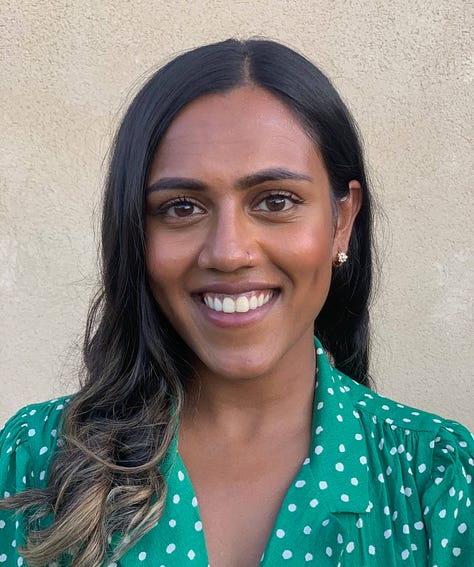
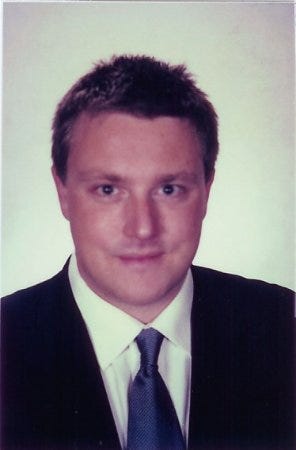
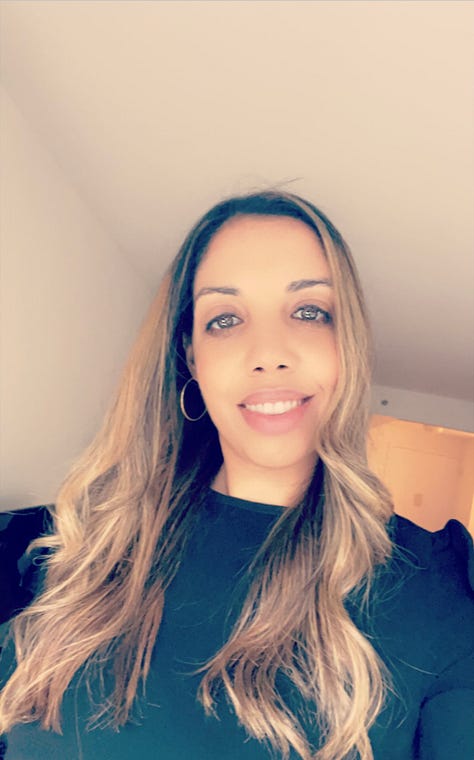
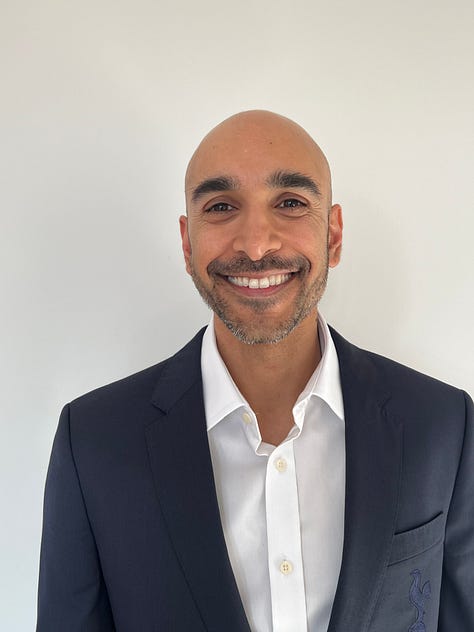
Juhi Saltzstein, MD: Oxfordshire, UK
Clifford Martin, MD: Tucson, AZ, USA
Asmi Sanghvi, DO: Los Angeles, CA, USA
Amr Abbass, DO: Clearwater, FL, USA
Irdina Aminuddin, MD: Petaling Jaya, Malaysia
Sujitha Selvarajah, MD: London, UK
Ryan Millea, MD: Avon, CT, USA
Kathleen Leger, MD: New york, NY, USA
Tamim Khanbhai, MD: Dubai UAE
You are a physician(MD, DO, MBBS) interested in longevity medicine. Connect with us!
Dr. Jeffrey Egler Joins Noom as New Chief Medical Officer
Dr. Jeffrey Egler, a double board-certified expert in lifestyle and functional medicine, has been appointed Chief Medical Officer at Noom to lead the company’s expansion into longevity-focused healthcare. With a strong track record in clinical innovation and holistic care, Dr. Egler will support Noom’s growing GLP-1 and longevity initiatives. His appointment underscores Noom’s commitment to becoming the go-to platform for health optimization, longevity, and whole-person wellness.
Inside the Biology of a 117-Year-Old Supercentenarian
Researchers conducted an unprecedented multiomics analysis of “M116,” a woman who lived to 117 years and 168 days, to uncover the biological features associated with extreme human longevity. Despite having markers of advanced age—short telomeres, clonal hematopoiesis, and aged B cells—M116 exhibited exceptionally youthful biological traits, including:
Robust mitochondrial function and low systemic inflammation
Rare protective genetic variants related to immune function, neuroprotection, and heart health
Highly efficient lipid metabolism (low triglycerides, high HDL)
Youthful gut microbiome rich in Bifidobacterium and linked to anti-inflammatory responses
A younger biological age across tissues, as determined by six different epigenetic clocks
Her epigenome maintained stability in repetitive regions while showing age-related hypomethylation elsewhere, supporting theories that aging and disease can be decoupled. The findings suggest that longevity results from a combination of protective genetic factors, lifestyle (e.g., Mediterranean diet, daily yogurt), and a resilient biological system—rather than the absence of aging biomarkers alone.
Key Takeaway:
Extreme lifespan may be less about avoiding aging entirely and more about maintaining functional resilience across systems despite aging-related changes.
The Multiomics Blueprint of Extreme Human Lifespan - BioRxiv (non peer reviewed)
Mitochondrial fatty acid oxidation drives senescence
A new study shows that DNA damage activates the mitochondrial protein BNIP3 via ATM, leading to increased fatty acid oxidation (FAO). This ramps up acetyl-CoA, promoting histone acetylation and activation of p16, a key marker of cellular senescence. The process also generates mitochondrial ROS, adding fuel to the aging fire. It’s a powerful reminder of how nuclear stress rewires mitochondrial metabolism to drive aging.
Science Advances - Recommended by Dr. Steven Murphy
Dual Sympathetic Blocks for Long COVID
A new pilot study shows that Dual Sympathetic Blocks (DSBs) may significantly improve symptoms of autonomic dysfunction, chronic pain, fatigue, and sleep issues in patients with Long COVID (PASC). Improvements were seen as early as one week and sustained at four weeks, with 88% of participants reporting benefit.
Researchers suggest that DSBs help restore sympathetic nervous system balance, improve cerebral blood flow, and reduce vasoconstriction - potentially addressing brain fog, dizziness, and vascular dysregulation common in Long COVID.
While the study was small and non-randomized, the findings support DSBs as a minimally invasive option worth exploring further in larger trials.
Cureus - Recommended by Dr. Jonathan Kuo

A Reduction in Video Gaming Time Produced a Decrease in Brain Activity
This study investigated how reducing video gaming time impacts brain development, particularly in experienced League of Legends (LOL) players. After limiting gaming to 3 hours per week for one year, expert gamers showed a significant decline in brain activity (measured by ALFF) and self-reported gaming skills—while non-experts showed no such changes. These findings suggest that long-term gaming enhances brain function in key cognitive networks, but reducing gaming time may reverse some of those gains, highlighting video gaming's influence on brain plasticity.
Frontiers Human Neuroscience - Recommended by Dr. Steven Murphy
Apple’s Biggest Health Push Yet With New AI Doctor
Apple knows what you eat.
Where you go.
What you buy.
Who you date.
How often you breathe, move, sleep, and whether your heart skips a beat.
Now, Apple is launching an AI Doctor
In its most ambitious health push to date, Apple is transforming its Health app into a full-blown AI-driven medical platform. Internally dubbed Project Mulberry, it’s powered by real physician input, personalized coaching, food tracking, and even fitness form correction using your iPhone camera. All delivered through a sleek, intuitive interface only Apple could design.
Can Apple become a clinic?
With the upcoming Health+ service, Apple aims to merge software, sensors, and AI to offer real-time, personalized health advice based on your own biometric and behavioral data. It’s hiring doctors, producing educational video content, and building a studio near Oakland just to make sure the delivery feels expert, warm, and human.
Apple’s health team, led by Dr. Sumbul Desai and COO Jeff Williams, is betting that care doesn’t have to start in a hospital, it can start in your hand.
The company is already collecting massive volumes of health data through the iPhone, Apple Watch, and even AirPods. Next up? Deep integration with food, movement, mental health, and preventive screening.
It’s not hard to imagine the future:
You get a nudge from your Apple Watch: “Your HRV has been trending low. You may be fatigued. Consider increasing magnesium and prioritizing sleep.”
You scan your meal, and the Health+ AI gently says: “Your sodium intake is high today. Let’s balance that with hydration and a potassium-rich snack.”
You receive a video from a real cardiologist explaining why your heart rate recovery matters more than your resting heart rate.
In short, your phone becomes your coach, your advisor, and your physician assistant - 24/7.
Apple vs. the Healthcare System
Let’s be real: Apple is entering a space where others have failed.
Haven (the JV betweeen JP Morgan, Berkshire Hattaway, and Amazon) never launched
Amazon’s clinic shut down.
Google Health EMR abandoned.
Big Tech’s attempts at healthcare delivery—disjointed, bureaucratic, and often tone-deaf.
But i think Apple is different. Not because it’s smarter, but because it’s already inside your body, your habits, your day. The trust, the interface, the consistency, it’s all there.
And frankly, Apple needs this.
In recent years, Apple has been criticized for lacking “the next big thing.” Health could be its category-defining innovation. Not a new device, but a new identity - from tech brand to health companion.
5 reasons why it could work
It already has your data: Biometric, behavioral, and contextual: Apple has the full picture.
It’s great at design: Making health intuitive is half the battle. Apple wins on UI/UX.
It’s ecosystem-driven: Seamless integration between Watch, iPhone, Fitness+, and now Health+.
It invests long-term: Noninvasive glucose monitoring has been in the works for 15+ years.
It doesn't need insurance: Apple bypasses legacy systems: direct-to-consumer health, subscription-based, and global.
5 reasons why it could fail
Data privacy: do you want a tech company knowing your biomarkers and blood results?
Equity & access: Is this just boutique wellness for the elite, or a real tool for population health?
No doctor: AI can coach, but can it diagnose, empathize, or triage emergency cases?
Commercial incentives: Will Apple prioritize your health or your engagement?
Trust: Do you trust Apple more than your doctor? Your hospital? Your insurance provider?
So, can Apple become a clinic?
It already is - just not a traditional one.
Apple won’t build hospitals. It won’t replace your cardiologist.
But it might outperform them in the domain of daily, continuous, preventive, personalized care, and even longevity care.
I see the power in this.
The future of medicine is not episodic, it’s ambient. Not reactive, it’s proactive. And not limited to clinics, it’s embedded in your life.
If Apple gets this right - and I mean ethically, responsibly, and inclusively - it will become the largest healthcare company in the world.
Longevity Docs Summit Cannes
This is not just another medical conference, this is the future of cutting-edge longevity medicine.
Join the world’s most visionary longevity physicians, scientists, and innovators for two days of breakthroughs, discoveries, and high-level networking under the French Riviera sun.
Summit. Awards & Black tie Gala. Expo.
📅 Date: June 25-26, 2025
📍 Location: Palace of Festival, Cannes - France
🎟️ Registrations are now open—and spots are limited.
👉 Apply now before it sells out. The New Gods of Medicine will be in Cannes. Will you?
Hormones Mastermind Replay
For the first time, get full online access to the entire event:
✔ 10 expert-led modules
✔ Real-world protocols and case studies
✔ On-demand viewing, anytime, anywhere
No fluff, no travel: just pure, actionable hormone and longevity education.
Replay Pass: $295
Longevity Conferences Calendar
A4LI DC Summit: Washington DC - April 28-30
Vitalist Bay - Berkeley, CA, Apr 4 - May 29
The Longevity Med Summit - Lisbon, May 6-8
Life Summit - Berlin, May 27-28
Dublin Longevity Summit: Dublin, July 2–4
ARDD: Coppenhagen, August 25-29
At Longevity Docs, we offer two distinct membership to support doctors in longevity medicine:
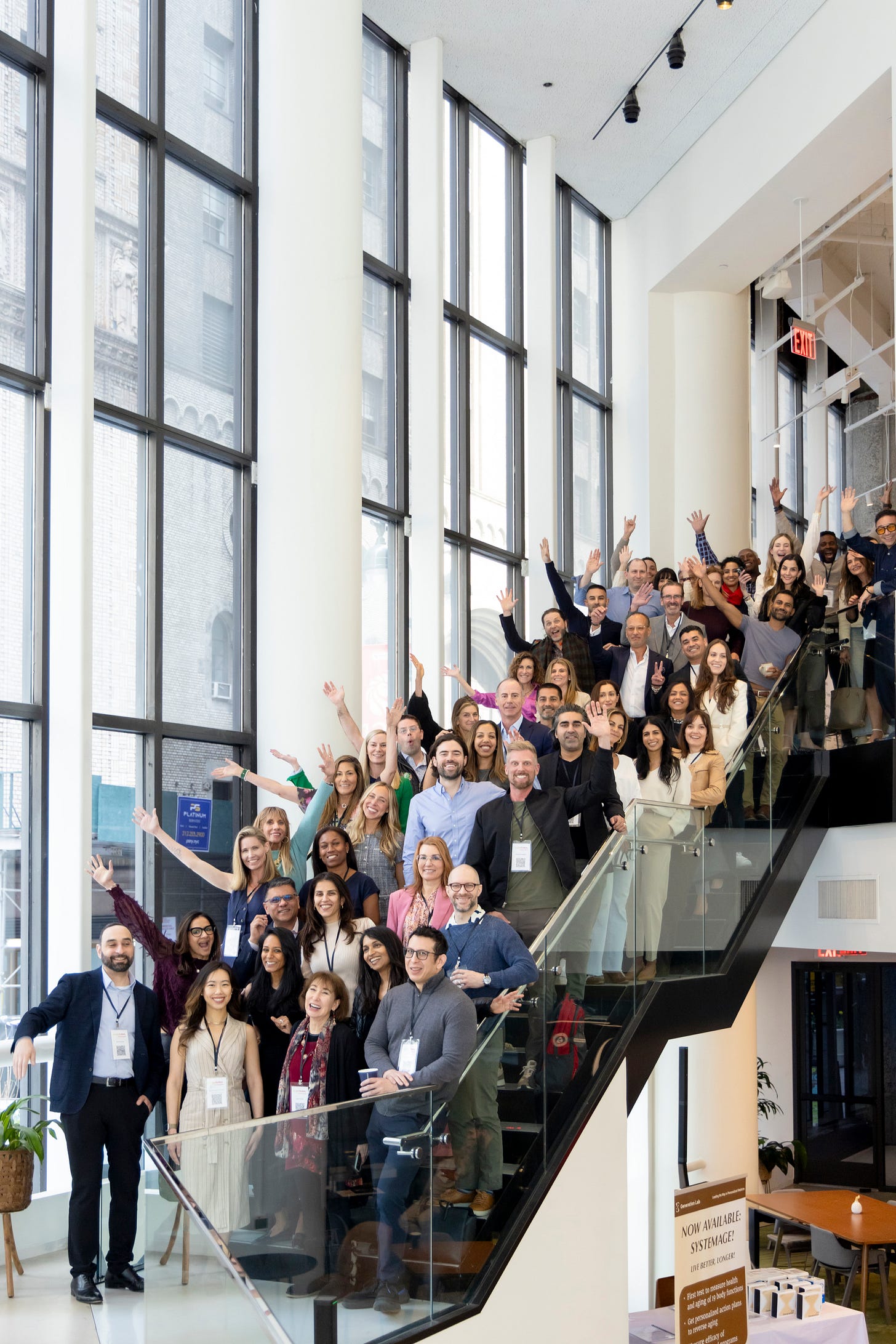
Basic Membership
Become part of a global network of 300 longevity-focused physicians across 50 countries, access to our app, educational resources, and opportunities to attend exclusive events.
Private Club Membership
For those seeking a more immersive experience, the Private Club Membership offers all the benefits of Standard Membership, plus exclusive access to private events, monthly forums, deeper collaboration with experts, and early insights into cutting-edge longevity practices.
Eligibility: Open exclusively to medical doctors operating a healthcare practice or leading a business dedicated to longevity.
Every Doctor Should be a Longevity Doctor
As a heart surgeon, I was often the doctor you hoped never to need . If you were in my operating room it means prevention was no longer an option. My father, a physician specializing in Chinese medicine and acupuncture, taught me about preventive care very early on. At 21, in 2001, I launched a foundation focused on operating on children in Africa, India, Cambodia, and Haiti so they could live longer, healthier lives.
In 2020, everything changed. When my wife contracted COVID-19, I realized the future of medicine lies in prevention. This led me to found a digital clinic dedicated to combating preventable age-related diseases, immersing myself in longevity research and new tech.
However connecting with like-minded doctors was the hardest part. I started a WhatsApp group with a dozen doctors passionate about longevity. We shared publications, new tech tools, and discussed case studies. It quickly grew into something bigger, and I realized we lacked a structured platform to learn, exchange insights, and shape the future of evidence-based longevity medicine.
From this need, Longevity Docs was born. Today, we unite 400+ physicians across 50 countries with a shared goal: to democratize longevity medicine. Imagine a world where physicians have access to evidence-based practices, collaborate with experts, and conduct research together - in real-time, anywhere in the world.
I firmly believe that a decentralized, collective intelligence of physicians is the key to extending human healthspan. Together, we can create a legacy where medicine helps people live better.
Dr. David Luu
Subscribe to the Longevity Docs Newsletter
Stay connected with the backstage of the Longevity Docs community, a network of over 300 physicians spanning 50 countries, united in our mission to democratize longevity medicine. Explore the latest in evidence-based longevity care, gain exclusive access to physician insights, and join us in shaping the future of this transformative field.
Newsletter Disclaimer:
The content shared in this newsletter, including the "Buzz in the Chat" section, is for educational purposes only. It is derived from peer-to-peer conversations among physicians within the Longevity Docs community and is intended to inform and engage our network of doctors.
Please note that these discussions do not reflect the official position of Longevity Docs and are not to be interpreted as medical advice or recommendations. The insights and opinions shared are those of individual physicians and are provided as part of our mission to foster collaborative learning and dialogue among healthcare professionals.
We encourage all readers to consult qualified healthcare professionals for personalized medical advice and to evaluate any medical information in the context of their clinical expertise and patient needs.










